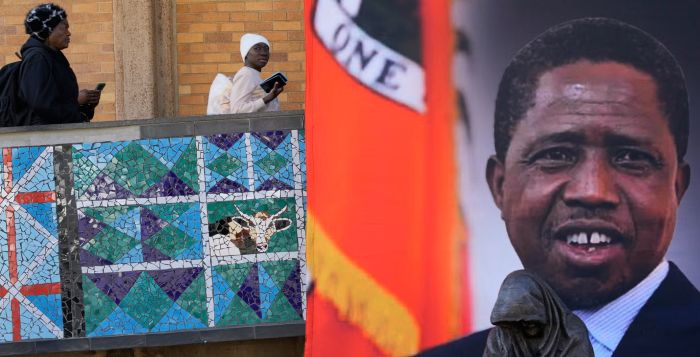(3 Minutes Read)
Former Zambian President Edgar Lungu’s funeral was abruptly halted in South Africa after a court order, following the Zambian government’s legal challenge demanding a state-led burial as mandated by law. The dispute reflects ongoing tensions between Lungu’s family—who sought a private farewell excluding current President Hichilema—and the state, which insists on full military honours for former heads of state. This dramatic episode underscores the deep political divisions and unresolved legacy surrounding Lungu’s controversial tenure and rivalry with Hichilema.
The funeral of former Zambian President Edgar Lungu was abruptly halted on Wednesday morning, leaving mourners stunned at the Cathedral of Christ the King in Johannesburg, South Africa. The interruption came after a Pretoria High Court judge issued an order stopping the burial ceremony, following an urgent application by Zambia’s Attorney General, Mulilo Kabesha.
The unexpected legal intervention occurred just as the late leader’s family and supporters gathered for what was meant to be a solemn farewell. Lungu’s wife, Esther, arrived visibly distraught after the judge’s order was announced. Instead of the planned burial, a mass was conducted in his memory. The court has scheduled a full hearing on the matter for August 4.
Lungu, who served as Zambia’s president from 2015 to 2021, passed away in South Africa earlier this month at the age of 68 after a prolonged but undisclosed illness. His family claims he had explicitly requested that his successor, current President Hakainde Hichilema, not attend his funeral—a reflection of the deep animosity that marked their political rivalry.
Despite these wishes, the Zambian government had made arrangements for a state funeral with full military honors, presided over by President Hichilema. According to Attorney General Kabesha, such honors are a legal requirement for former heads of state, referencing a prior court ruling related to the burial of Zambia’s first president, Kenneth Kaunda.
Kabesha emphasized that “a former president is not a private arrangement, is not private property, [but] is national property and his burial should be handled by the state.” He added that once a period of national mourning is declared, the law mandates a state-led funeral.
Court documents filed by Kabesha also revealed that a grave had already been prepared for Lungu at Zambia’s national cemetery, where all previous presidents have been interred. This marks the third time a state funeral for Lungu has been postponed.
The political rivalry between Lungu and Hichilema has been contentious for a long time. After defeating Hichilema in the 2016 election, Lungu later lost to him in a hard-fought 2021 race. Their relationship deteriorated further when Hichilema was arrested in 2017 on treason charges after his convoy allegedly failed to yield to Lungu’s motorcade. The arrest drew international condemnation, and Hichilema was released after four months.
Following his departure from office, Lungu accused Hichilema’s administration of political persecution. In 2023, Zambian police reportedly restricted Lungu from jogging in public, citing “political activism” and security concerns. Meanwhile, his family has been embroiled in legal troubles. His wife, Esther Lungu, currently faces charges related to vehicle theft, to which she has pleaded not guilty.
Read Also;
Lungu had attempted to re-enter politics in 2024 but was barred from contesting the 2026 presidential election. Zambia’s Constitutional Court ruled that his initial term—from 2015 to 2016, following the death of then-President Michael Sata—constituted a full presidential term under the law, making him ineligible to run again. As Zambia continues to grapple with the legacy of its polarising former leader, the legal and political disputes surrounding his burial have laid bare the enduring divisions that defined his presidency—and now his death.





